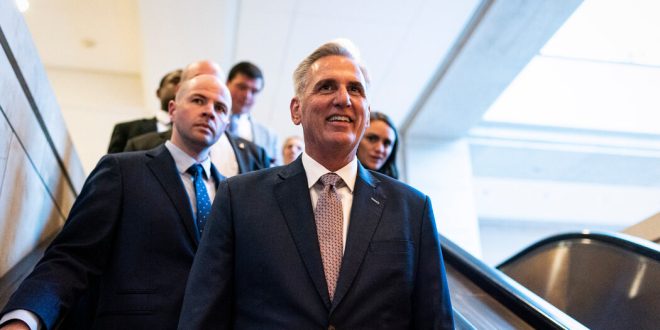Representative Kevin McCarthy of California on Tuesday resoundingly won the Republican nomination for speaker, but a challenge from his right flank that drew more than two dozen defectors showed weakness in his hold on his party, indicating a potentially rough fight ahead of him to secure the job at the start of the new Congress.
The vote, which took place as his party was still clawing its way to what appeared likely to be a historically slim majority, was a successful first showing for Mr. McCarthy, the five-term congressman from California, in his quest to win the speaker’s gavel. He only needed to secure support from a majority of his conference — including incumbents, newly elected members and candidates in uncalled races — in a secret-ballot vote held behind closed doors at the Capitol.
In a vote of 188-31, Mr. McCarthy easily defeated a challenge on his right from Representative Andy Biggs of Arizona, a former chairman of the ultraconservative Freedom Caucus who ran as a protest candidate.
Walking into the closed-door meeting ahead of the balloting, Mr. McCarthy told reporters he felt “great” about his standing, brushing off questions about the challenge to his leadership, which could make his job impossible next year should he be able to secure it.
“The goal when I became leader four years ago was to win the majority,” he said. Republicans, he said, were on the track to do so.
But Mr. McCarthy’s nomination was only the opening act in what was shaping up to be a long and painful path to the speakership, and it exposed bitter divisions within the party, with the hard-right faction of Mr. McCarthy’s conference — many of whom have sought for years to weaken him — newly emboldened after a disappointing showing for the party in the midterm elections, and eager to squeeze him for concessions.
It revealed that Mr. McCarthy still does not have the support of the 218 lawmakers that he would need to cement his role as leader in a vote of the entire House in January. With a razor-thin majority and all Democrats expected to oppose him, Mr. McCarthy will only be able to afford to lose a few Republicans.
That mathematical reality has strengthened the hand of right-wing lawmakers who are pressing Mr. McCarthy to enact changes that would maximize their power and weaken his, including effectively allowing any Republican to move to dump the speaker at any moment, ending pandemic-era proxy voting, and negotiating directly with the speaker for committee assignments.
“My bid to run for speaker is about changing the paradigm and the status quo,” Mr. Biggs said. “Minority Leader McCarthy does not have the votes needed to become the next speaker of the House, and his speakership should not be a foregone conclusion.”
And he hinted that Mr. McCarthy was to blame for the party’s historically poor performance in last week’s elections, saying, “I look forward to serving our great nation and steering our country in a better direction after the disastrous midterms.”
Mr. McCarthy’s allies pitched him as a battle-tested unifier who had brought them to the House majority, however slim. Representative Kelly Armstrong of North Dakota stood to support the minority leader in the closed-door meeting that preceded the vote and called for unity, saying that Republicans needed a leader who understood that, “when we fight among ourselves, the Democrats win,” according to people familiar with the remarks who described them on the condition of anonymity.
House conservatives have a long history of bedeviling their leaders and plunging leadership elections into chaos. John Boehner was driven out as speaker in 2015, resigning rather than facing a potentially humiliating fight driven by the right flank of his party. And Mr. McCarthy himself was thwarted by a clutch of hard-liners after he mounted a bid to succeed Mr. Boehner.
But Mr. McCarthy’s task now is in some ways singularly difficult, saddled with a razor-thin majority and a group of far-right lawmakers more obstreperous than their predecessors.
 Top Naija News: Nigerian News, Breaking News Nigeria and World News Top Naija News is a daily news publication in Nigeria, delivering the latest breaking news in Nigeria and around the world.
Top Naija News: Nigerian News, Breaking News Nigeria and World News Top Naija News is a daily news publication in Nigeria, delivering the latest breaking news in Nigeria and around the world.




